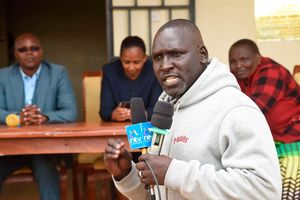
Senators and Members of the National Assembly have renewed their sibling rivalry with the former now crafting parallel proposals to amend the Constitution.
The latest tiff between the two involves a move by Parliament to entrench the National Government Constituency Development Fund (NG-CDF), the National Government Affirmative Action Fund (NGAAF) and the Senate Oversight Fund (SOF) into the Constitution.
The constitutional amendment initiative is being spearheaded by the National Assembly’s Departmental Committee on Justice and Legal Affairs.
However, the two Houses are at crossroads over how the process should be undertaken with senators accusing the MPs of sidelining them.
Early this month, between May 5 and 7, MPs conducted public participation on the Constitution of Kenya (Amendment) Bill, 2025, following recommendation of the National Dialogue Committee.
The Bill, which underwent its First Reading on March 12, 2025, is sponsored by Rarieda MP Otiende Amollo and Ainabkoi MP Samuel Chepkonga and is aimed at securing constitutional backing for the funds.
Senators, nonetheless, dismissed the process, alleging exclusion, saying that MPs hijacked the process to push their own interests, particularly the NG-CDF.
Taking the fight to the MPs’ doorsteps, senators have formed a special team led by the Senate Majority and Minority Leaders, Aaron Cheruiyot (Kericho) and Stewart Madzayo (Kilifi).
Nairobi Senator Edwin Sifuna, his Kisumu counterpart Tom Ojienda, Bomet’s Hillary Sigei and Okong’o Omogeni (Nyamira) are part of the team.
The senators have termed the recently-concluded public participation exercise by the National Assembly as a move only aimed at entrenching CDF and nothing else.
For their part, they said they are determined to strengthen the legislative authority of the Senate, a long-standing source of tension between the two Houses.
The senators stated they would even be willing to drop the proposed Senate Oversight Fund if that would help reinforce their constitutional mandate.
But even if the National Assembly goes ahead with the Bill and passes it, it could face additional challenges in the Senate, 45 senators are needed to approve it.
Past attempts to amend the Constitution have faltered due to the two-thirds majority requirement, with more than 20 Bills failing to pass.
The latest tussle between the two Houses is just a tip of the iceberg with the senators further accusing their counterparts of undermining their powers by rejecting or terminating Senate-backed proposals in the pretext of being “money bills”.
A money bill is a legislative proposal that primarily deals with financial matters such as taxation, public expenditure, or borrowing. Under the Constitution, the Senate is barred from considering money bills.
The senators have now resolved to apply for a review of a Supreme Court decision delivered in March, which upheld as constitutional 21 laws passed by the National Assembly without the input of the Senate.
The court rejected a Senate appeal that had challenged the constitutionality of 23 Acts passed solely by the National Assembly, upholding 21 of them.
Chief Justice Martha Koome, alongside Justices Philomena Mwilu, Mohamed Ibrahim, Smokin Wanjala, Njoki Ndung’u, Isaac Lenaola, and William Ouko, ruled that the National Assembly did not require the Senate’s input to pass the contested legislation.
“We uphold the Court of Appeal’s finding that the listed Acts passed by the National Assembly did not require consideration and enactment by the Senate, and are therefore constitutional,” said Justice Koome.
The Senate, its Speaker, the Senate Majority Leader, and Minority Leader had jointly filed the appeal, seeking an interpretation of Article 110(3) of the Constitution. The article requires the Speakers of both Houses to jointly determine whether a Bill concerns county governments.
In addition to legislative frustrations, senators voiced concerns over alleged favouritism by the Joint Parliamentary Services and the Parliamentary Service Commission (PSC).
They claim the entities are biased toward the National Assembly, pointing to unequal allocation of budgets and logistical support, which they say hampers the Senate’s ability to operate effectively.
Senators also demanded the PSC confirm the employment of several long-serving staff members—some of whom have remained on contract for over a decade.






